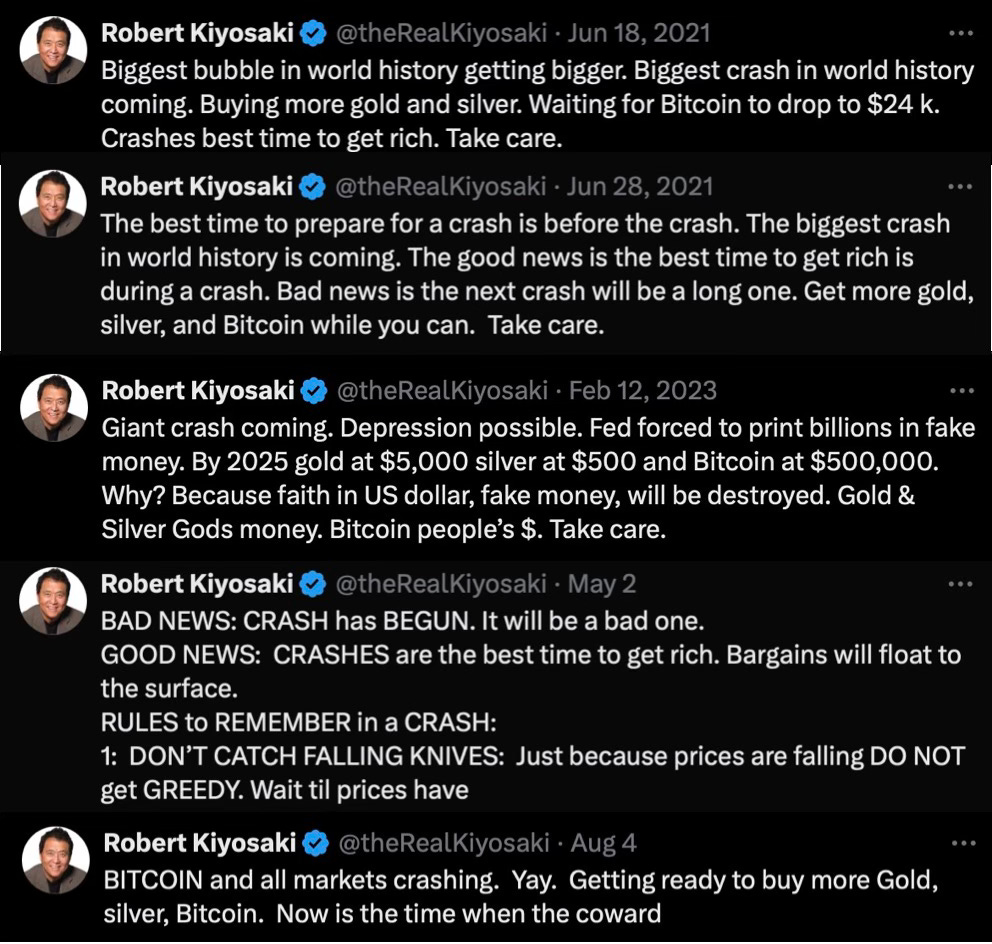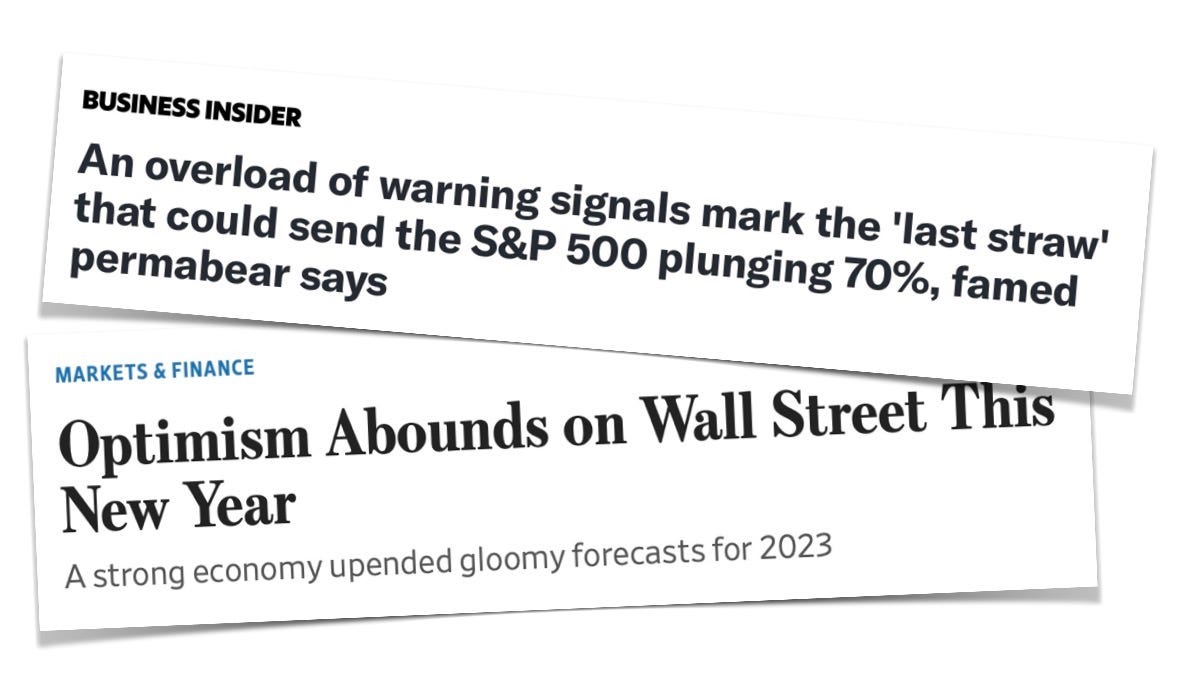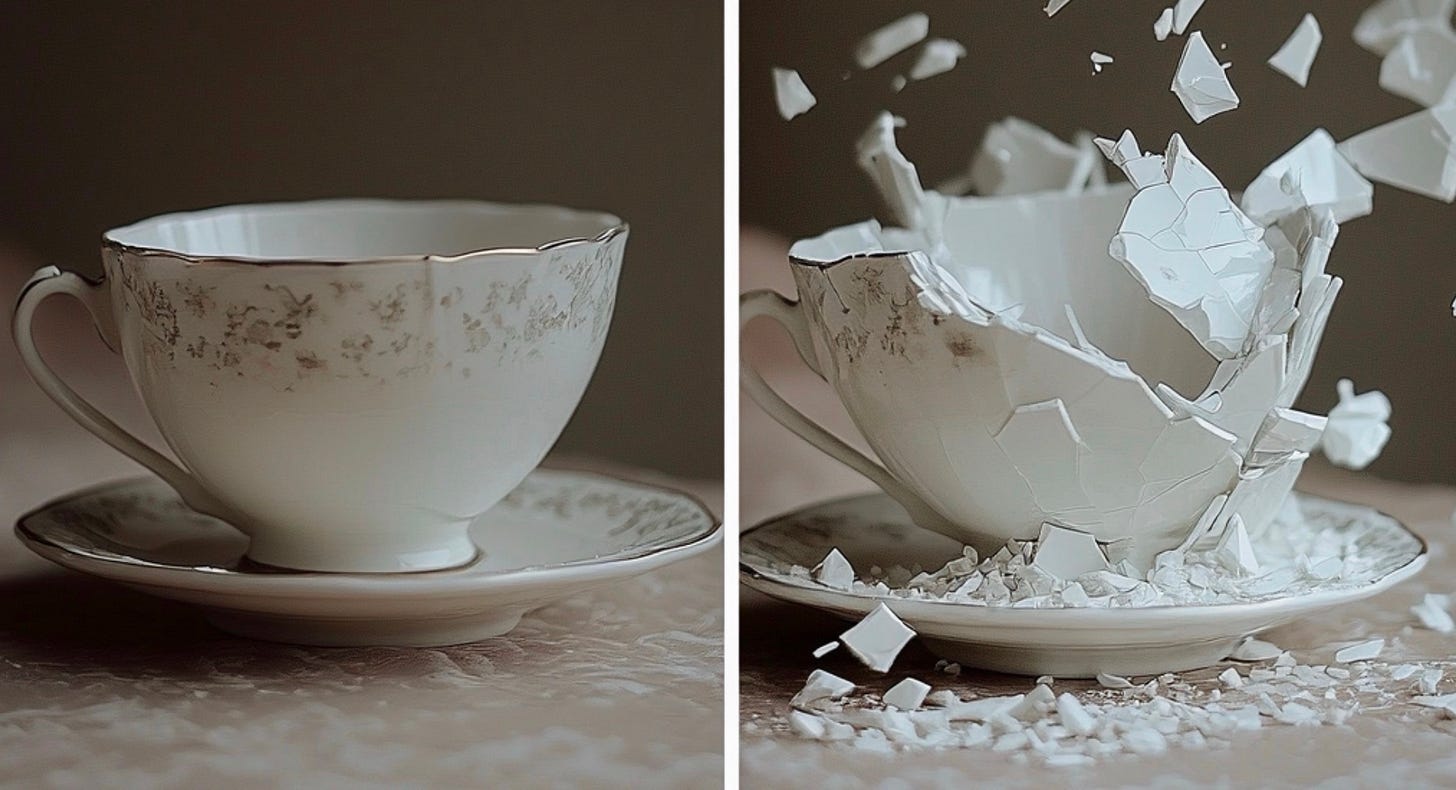"The bull market is already over"
Permabear rants as radical acceptance of the impermanence of reality
Robert Kiyosaki likes to cry wolf.
His Twitter/X feed is a series of dire forecasts of financial end times:
Who’s Robert Kiyosaki, you ask? He’s the guy who wrote the personal finance book ‘Rich Dad, Poor Dad’ and a bunch of others.
Anyway, these days he’s a permabear1.
What’s a permabear, you ask? [So inquisitive!] Here’s a punchy definition:
permabear (plural permabears)
(finance, informal) An investor who consistently acts in the expectation that the value of stocks and shares will fall regardless of market conditions.
Antonym: permabull2
Tapping into our negativity bias
Kiyosaki isn’t alone. Permabears and their cry-wolf predictions are ubiquitous. This kind of messaging is the lifeblood of media outlets like BNN, which are themselves businesses at the end of the day. Scary headlines attract eyeballs and eyeballs make them money. [There’s no judgment here. Gotta keep the lights on.]
We humans have a real negativity bias. Consider the following two articles—which one would you read first? [Be honest.]
Of course our first impulse is to read about the S&P plunging 70%. That represents a possible threat to our financial well-being and threats get higher priority in our Darwinian-designed brains than promises of windfalls.
It’s hard to ignore news like this. First of all, it’s everywhere. And, secondly, our reptile brains impel us to want to learn more.
I do my best to ignore it. I quickly turn the page or turn off the show when I encounter pieces in this vein. I don’t need that negative news spin invading my consciousness.
More recently, though, I’ve been putting my own spin on permabear ranting: I reframe it as radical acceptance of impermanence.
Impermanence & being more okay with disaster
Impermanence is the substrate for so much human suffering. We suffer because we deny the basic truth that life is ever-changing. We tell ourselves that things in our lives—relationships, jobs, beliefs—are permanent when they are all in a constant state of flux. We just don’t notice the change or we refuse to see it.
Accepting impermanence is the path to inner peace. Truly embracing it. Being equanimous with whatever life spits at you.
But this is easier said than done. Accepting impermanence means being ‘okay’ with things changing—loved ones dying, jobs ending, marriages failing, the S&P500 actually plunging 70%, etc. We don’t want these things to happen because of all the misery they bring to our lives. And yet happen they will.
Getting ‘okay’ with impermanence, death, divorce, financial ruin is slow going. For any of us other than the Buddha, we’ll probably never be perfectly ‘okay’ with these things. But Buddhism offers us the chance to be a little more ‘okay’ with them. Kind of like the 10% happier that Dan Harris talks about. 10% more okay with disaster.
How do we get more okay with disaster?
As I’m learning in my own life, it happens a little bit at a time. Almost undetectably. The way I promote ‘okayness’ in my life is by consciously reminding myself of the fleeting nature of things—good or bad, big or small—as I go through my day.
This is what Zen koans and Buddhist parables and remembrances are for. They’re like little sticky notes of important ideas that we should think about from time to time.
Here is one of the more useful Buddhist sticky notes on impermanence:
“You see this goblet?” asks Achaan Chaa, the Thai meditation master. “For me this glass is already broken. I enjoy it; I drink out of it…But when I put this glass on the shelf and the wind knocks it over or my elbow brushes it off the table and it falls to the ground and shatters, I say, ‘Of course.’ When I understand that the glass is already broken, every moment with it is precious.”
- Parable of the broken cup as told by Mark Epstein (from Thoughts Without a Thinker: Psychotherapy from a Buddhist Perspective)
Think about this parable (“this glass is already broken”) the next time you cuddle your dog or bask in your growing portfolio or pick up your favourite mystery novel or go to the dentist. Tell yourself:
“This dog is already dead.”
“This portfolio is already gutted.”
“This novel is already over.”
“This dentist is already dead.”
Be bearish on permanence
Be a permabear like Robert Kiyosaki. Be bearish on permanence. Or bullish on impermanence (impermabull?). Just don’t be nihilistic or headline-seeking.
Radical acceptance of impermanence is life-affirming (and definitely not headline fodder). You cherish what’s in front of you more. You’re more grateful for the time that you do have with your dog.
Me, I’m cherishing the S&P500’s latest all-time high today because it’s only downhill from here. That’s not a permabear prediction. That’s acceptance.
- The Buddh-i$h Investor
Take home points:
Permabears grab headlines because of our brain’s negativity bias. Negativity sells.
Be your own permabear. Be bearish on permanence. Remind yourself that everything is fleeting, so enjoy it while you can.
If you’re looking for more:
Ben Carlson ‘dunking on doomers’ like Robert Kiyosaki:
Noah Rasheta’s ever-insightful discussion of gratitude and the parable of the broken cup
Permabear is a label. Like “Democrat” or “masochist.” Buddhism teaches that we are so more than our labels. I’m lazily using the label “permabear” here to make a bigger point about Buddhism/life.
Permabulls don’t get nearly as much attention on Twitter even though 100+ years of stock market returns give us every reason to bullish in the long-term.





Came across your Substack through Cara Lai’s post. I like what you’re doing and wanted to say keep it up! I subscribed.